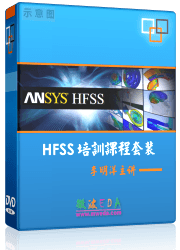- 易迪拓培训,专注于微波、射频、天线设计工程师的培养
HFSS15: Floquet Ports Theory
The Floquet port in HFSS is used exclusively with planar-periodic structures. Chief examples are planar phased arrays and frequency selective surfaces when these may be idealized as infinitely large. The analysis of the infinite structure is then accomplished by analyzing a unit cell. Linked boundaries most often form the side walls of a unit cell, but in addition, at least one "open'' boundary condition representing the boundary to infinite space is needed. The Floquet port is a specialized boundary condition to handle this case.
The Floquet port is closely related to a Wave port in that a set of modes, here "Floquet modes", is used to represent the fields on the port boundary. Fundamentally, Floquet modes are plane waves with propagation direction set by the frequency and geometry of the periodic structure. Just like Wave modes, Floquet modes have propagation constants and experience cut-off at a sufficiently low frequency.
When a Floquet port is present, HFSS performs a modal decomposition that gives additional information on the performance of the radiating structure. As in the case of a Wave port, this information is cast in the form of an S-matrix interrelating the Floquet modes. In fact, if Floquet ports and Wave ports are simultaneously present, the S-matrix will interrelate all Wave modes and all Floquet modes in the model. Floquet ports can be combined with lumped ports, but not with terminal ports.
HFSS 学习培训课程套装,专家讲解,视频教学,帮助您全面系统地学习掌握HFSS
上一篇:Frequency-Dependent Material Properties
下一篇:Five: Aligning Objects


